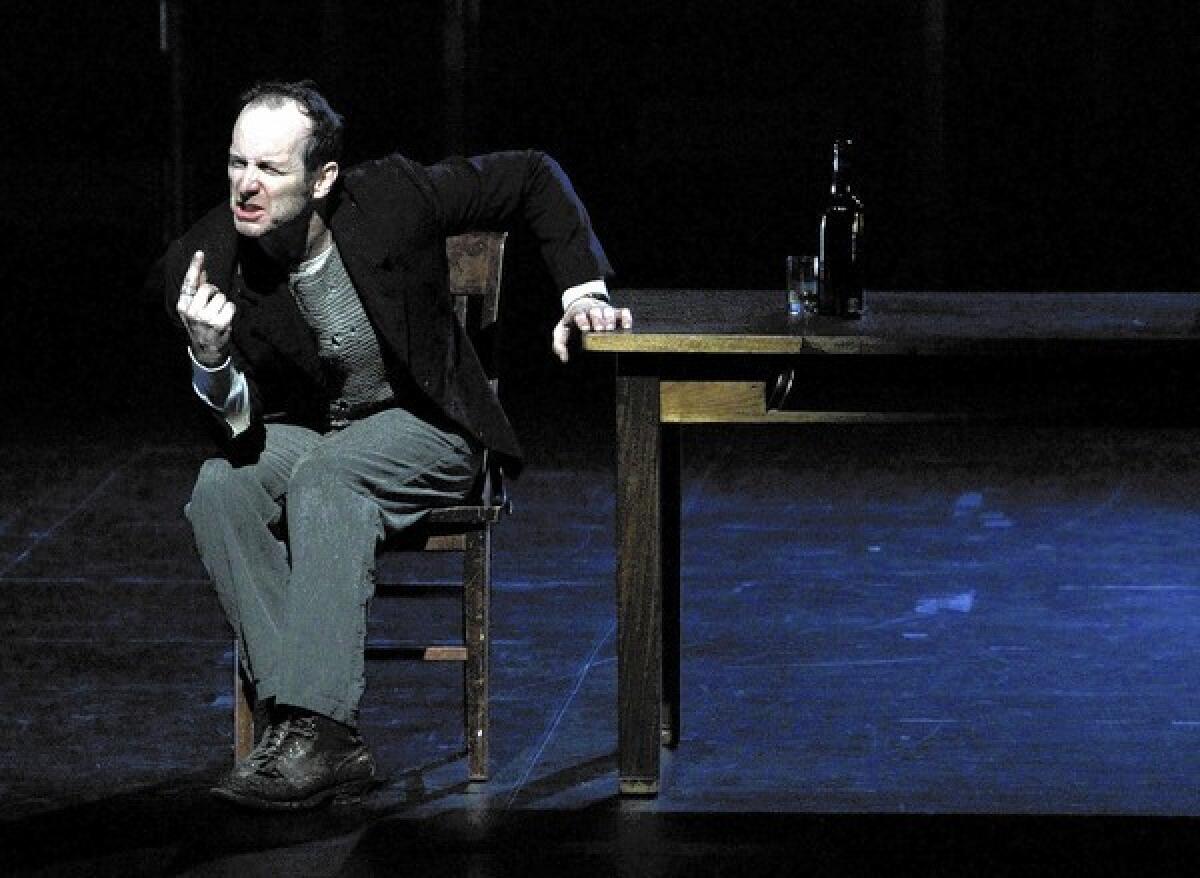Review: A poet embedded among troops lives to tell ‘An Iliad’

Aristotle placed spectacle near the bottom of his list of tragedy’s essentials, and anyone who ventures to see “An Iliad” at the Broad Stage will agree that special effects aren’t needed to bring to the stage Homer’s deathless epic in all its agonizing, heroic glory.
The set is largely bare, save for some scattered props and backstage equipment that never let us forget we are in a theater.
The cast consists of one actor, Denis O’Hare. Little did we know from his Tony-winning turn as the gay baseball fanatic in Richard Greenberg’s “Take Me Out” that he harbors legions of legendary Greeks, Trojans and immortal deities within himself.
PHOTOS: Arts and culture in pictures by The Times
There’s a musician, bassist Brian Ellingsen, who slashes away at Mark Bennett’s emotive score with the intensity of a sword-carrying soldier on the front lines.
And at the center of it all is one of the greatest stories ever told.
Homer’s poem, building to the inevitable clash between the Greek warrior Achilles and the Trojan defender Hector — heroic emblems of two civilizations wearied by protracted war — has been adapted by O’Hare and director Lisa Peterson from a translation by Robert Fagles.
The tone is conversational, almost improvisatory. The rhetoric soars for moments with battlefield exploits but then is brought back down to our contemporary idiom to close the gap between this ancient mythological world and our own.
O’Hare’s main role is that of the poet, and the act of storytelling is as important as the story itself. This raffish figure wearing an overcoat, dusty clothes and a battered fedora calls on the muses in his ancient tongue to inspire him. He then immediately switches registers to simple English: “Back then, oh, I could sing it. For days and nights. On and on, every battle, every old digression, I would sing and sing ….”
Sick of war and the ceaseless destruction of generations of humanity, he concludes these introductory remarks with the line, “Every time I sing this song, I hope it’s the last time.”
He knows that the place names from where the scores of soldiers have sailed will mean little to audiences today. “The point is,” he intones, “on all these ships are boys from every small town in Ohio, from farmlands, from fishing villages … the boys of Nebraska and South Dakota … the twangy boys of Memphis … the boys of San Diego, Palo Alto, Berkeley, Antelope Valley.”
Moving freely from narration to impersonation with the help of Scott Zielinski’s quicksilver lighting design, O’Hare quickly recaps the incidents involving Paris and Helen that provoked this conflict. He fills us in on Achilles’ rage at Agamemnon for claiming the young woman he considers his prize of war. Hector’s goodness is movingly recounted as is Patroclus’ loyalty and valor.
A storyteller serving as his own illustrator, O’Hare sketches these figures with his own supple voice and elastic body. He might not have the gruff ferocity of Henry Woronicz, who brought the testosterone-laden warriors to hot-tempered life at La Jolla Playhouse and Berkeley Rep. There’s a fey quality to O’Hare that keeps the poet ever in sight. But a story this gripping doesn’t require much naturalistic enhancement, and he’s able to conjure Helen’s character with a lazy slouch and remind us of Hector’s integrity with a furrowed brow.
One quibble: O’Hare, who alternated in the role with Stephen Spinella at the 2012 New York Theatre Workshop production, makes too big a show of the poet’s supposed spontaneity with false starts and stammered line readings. His delivery at times is overly mannered.
The pacifist intent of this rendering of Homer’s masterpiece reaches a peak with a list of the battles of history, starting with the war of Alexander the Great and ending with modern-day Syria. There are references that will have you recalling the national debate on the surge strategy employed in Iraq and Afghanistan.
That Homer’s poem is as much a glorification of the heroism of war as a critique of its human waste might go unnoticed in this handling. But this minimalist staging of “An Iliad” is unquestionably a victory of the theatrical imagination.
“An Iliad”
Where: The Broad Stage, 1310 11th St., Santa Monica
When: Contact theater. Ends Feb. 2.
Tickets: $47-$98
Contact: (310 ) 434-3200 or https://www.thebroadstage.com
Running time: 1 hour, 40 minutes
More to Read
The biggest entertainment stories
Get our big stories about Hollywood, film, television, music, arts, culture and more right in your inbox as soon as they publish.
You may occasionally receive promotional content from the Los Angeles Times.







